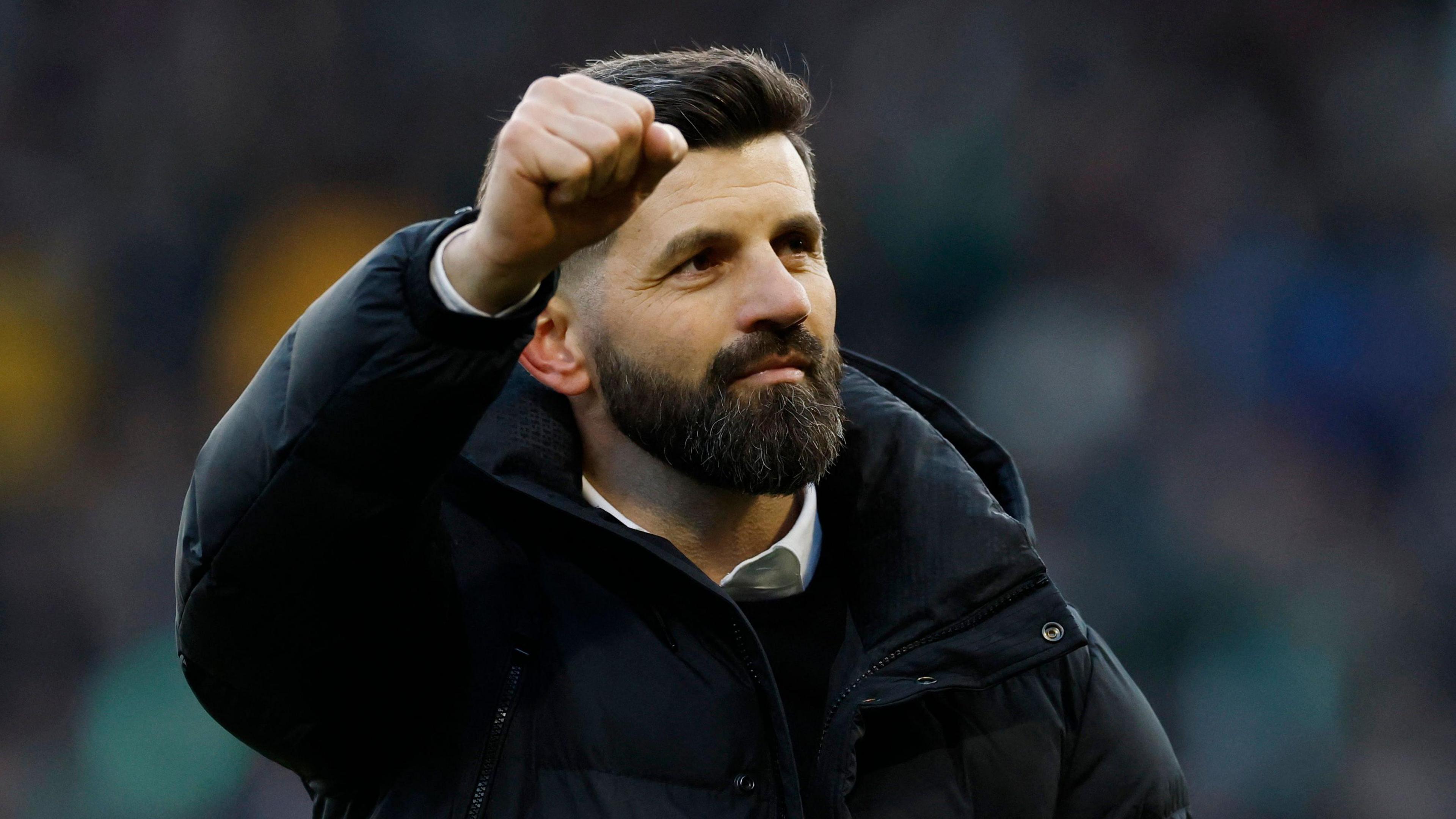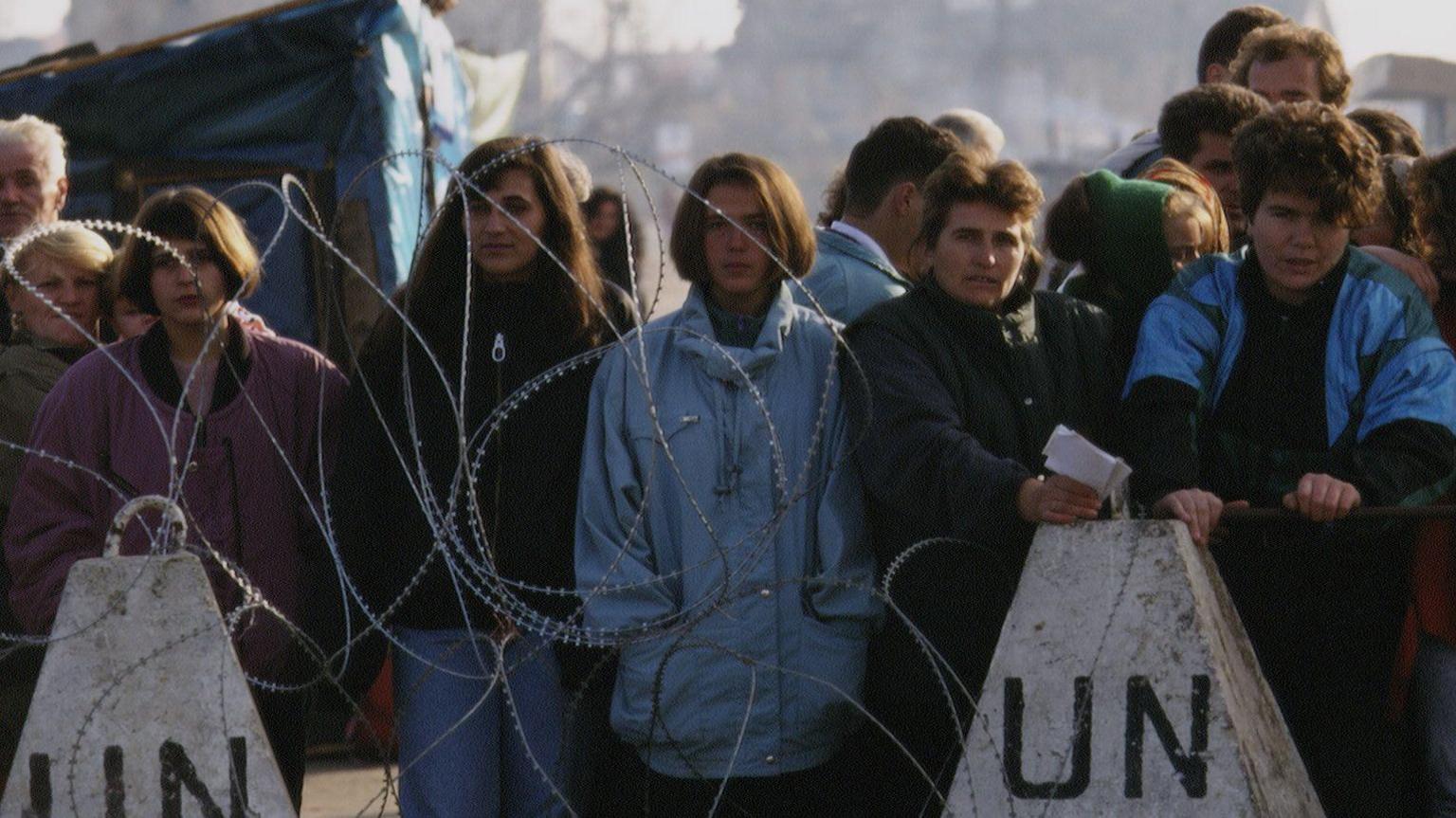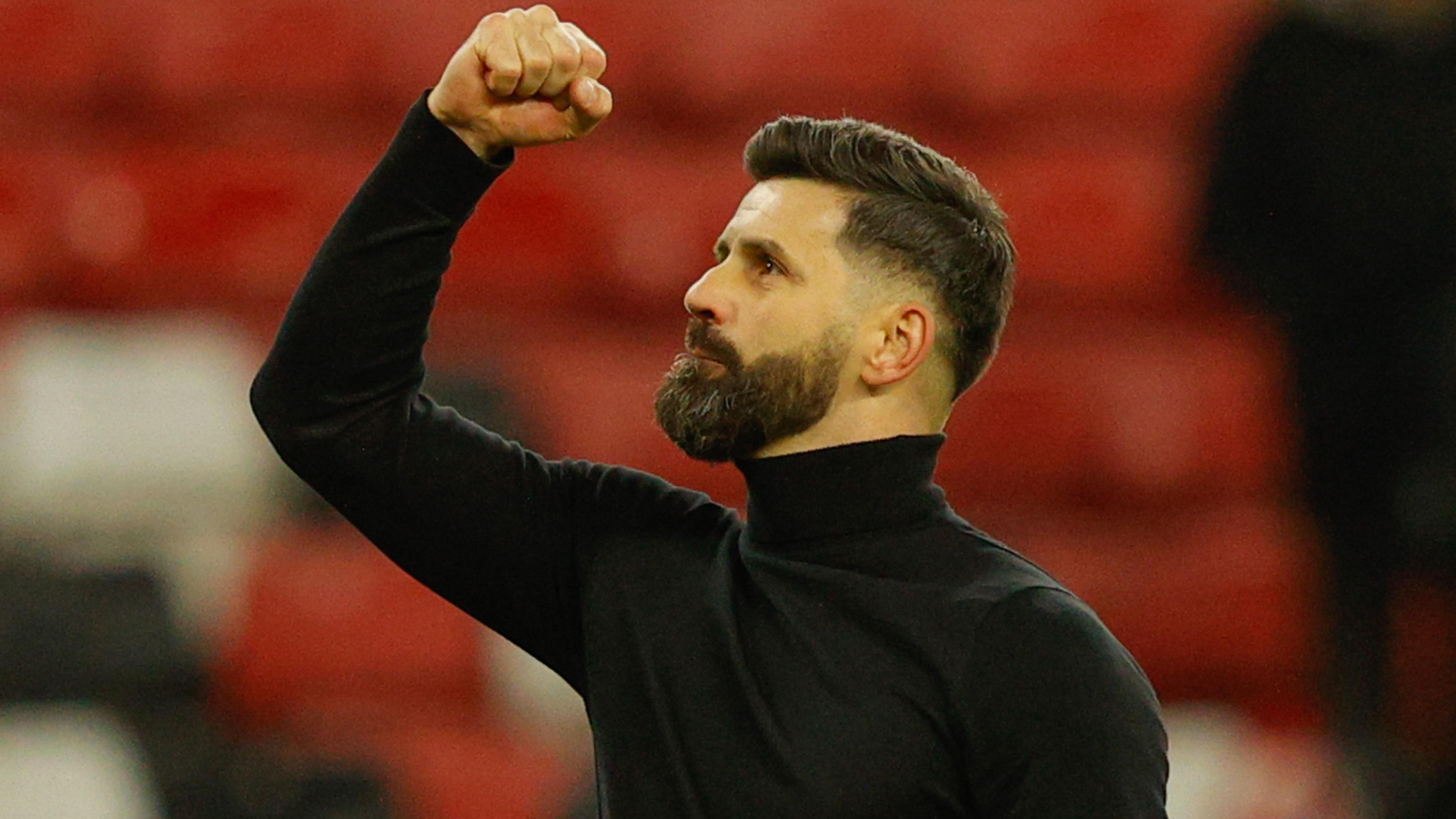From refugee to coach - the man behind Plymouth's upset of Liverpool

Miron Muslic was a relative unknown in English football before joining Plymouth Argyle
- Published
Plymouth manager Miron Muslic has achieved what many in football thought was impossible - guiding his bottom-of-the-Championship Plymouth Argyle side past Premier League leaders Liverpool in the FA Cup.
Ryan Hardie's penalty was enough to secure a famous fourth-round upset at Home Park on Sunday.
"It is a magical day for us. I told the lads to enjoy it, and we are now part of Argyle history," said Muslic.
"It is a big day for all of us, somehow I feel we deserve this day.
"I am speechless. Normally, they tell me I'm eloquent. It is a proud moment. It is a big day."
Compared to the story of Muslic's start in life, beating six-time European champions Liverpool may have felt relatively easy.
In 1992, as a nine-year-old, Muslic - who took over as Argyle head coach from legendary England striker Wayne Rooney last month - was forced to flee his home town of Bihac in Bosnia.
They got out just in time. In June 1992, just a month or two after the Muslic family left Bihac, it fell under a three-year siege by Serb-led forces during a bitter civil war.
"We had to leave Bosnia, and Bihac, our hometown, literally overnight, grabbing things you can grab with your hands," he explains powerfully to BBC Sport.
"That's where our journey, or our new life, started."

Thousands were forced to flee Muslic's hometown of Bihac when it came under siege in 1992
Muslic, his sister and parents fled 400 miles (650km) to Innsbruck in Austria with no idea what they would find and unable to speak the language with the local German accent, particularly hard to understand.
"We struggled our whole life, and this part of struggling is part of my journey, and that's why I'm always very optimistic and very positive," says Muslic, who guided Cercle Bruges to the Uefa Europa Conference League this season.
"I've been in more challenging situations in my life than being a head coach and facing a possible draw or a defeat at the weekend.
"And that's also the message I want to deliver consistently towards the players, that life is a struggle with beautiful surprises, and there is always something worth fighting for.
"Nothing was easy for me, or for my family or for my sister. We became refugees, and it's not a pretty thing, but I never had the feeling that I missed something in my life.
"My parents tried very hard to provide us with the things that we needed - my father worked for over 30 years as a waiter, my mother was a cleaning lady, and they tried very hard to give us a good life.
"All the things that have happened over the last 30 years helped me become who I am today and also achieve some things that maybe have been impossible.
"But nothing is impossible if you truly believe, if you commit, if you convince, and if you go really, really fully."
Allow X content?
This article contains content provided by X. We ask for your permission before anything is loaded, as they may be using cookies and other technologies. You may want to read X’s cookie policy, external and privacy policy, external before accepting. To view this content choose ‘accept and continue’.
It is that belief and commitment that Argyle showed as they upset a Liverpool side who finished top of the Champions League group stage and have a healthy six-point lead at the summit of the Premier League under Arne Slot.
Conversely, Muslic inherited an Argyle side spiralling towards League One.
To add to his tough start, he saw his best defender, Lewis Gibson, and star forward, Morgan Whittaker, leave during the transfer window.
But, just like Muslic's early life in Austria, the shoots of recovery could well be sprouting under him at Argyle.
Last Saturday, the Pilgrims paid a club record fee for Ukraine defender Maksym Talovierov and came from a goal down to beat play-off contenders West Bromwich Albion 2-1 - a victory that ended a 15-game winless run in the league.
And it is football - and a love of its ups and downs - that has driven Muslic from a child who could not speak the language to a coach so fluent in English that his rousing first speech to Argyle's players, external has been watched by the best part of four million people on social media.
As a teenage forward, he joined Wacker Innsbruck before a career that took in the top five tiers in Austria and a short spell in Croatia.
He credits the sport with helping him adapt to his new homeland, allowing him to "have the privilege to call not only Bosnia, but also Austria, my home."
"That's why football is so important, because it's universal," he says.
"Because when you're on a football pitch or somewhere on the street, it's not about your name, your last name, it's not even about your refugee status or not; it's only about the game.
"Where religion, nationality, is my mother a cleaning lady or a lawyer has no impact, has no influence.
"That's why we love this beautiful game, and that's why I always call it 'the game we love', and that's the magic of football."

Muslic has led Plymouth Argyle to a win and two draws in his five league matches in charge
Muslic's passion is apparent to anyone who meets him.
He is a man who has a steely look in his eyes but a warm and welcoming nature and is able to engage a room - just ask anyone who watched the video of his first speech to Argyle's players.
It all comes down to his background. "It's the definition of who I am today as a coach, but most important, who I am today as a human being," he says of his early life.
Having pulled off a memorable cup shock in Devon, Muslic shows that you can make it no matter what hurdles are in your way.
"If I look to the locker room of Argyle, they are just lads from all over the world, and it works," he says. "So imagine the world as a locker room; it would be a good place to be."
FA Cup highlights: Plymouth Argyle 1-0 Liverpool